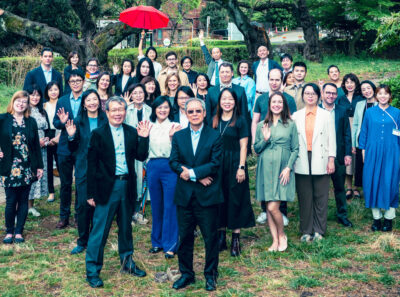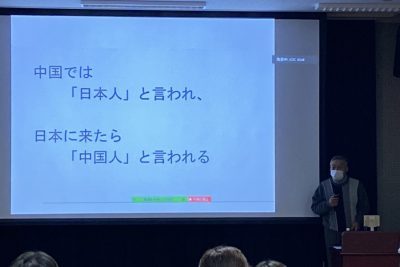Four Italian Philosophers on the Covid-19 Emergency
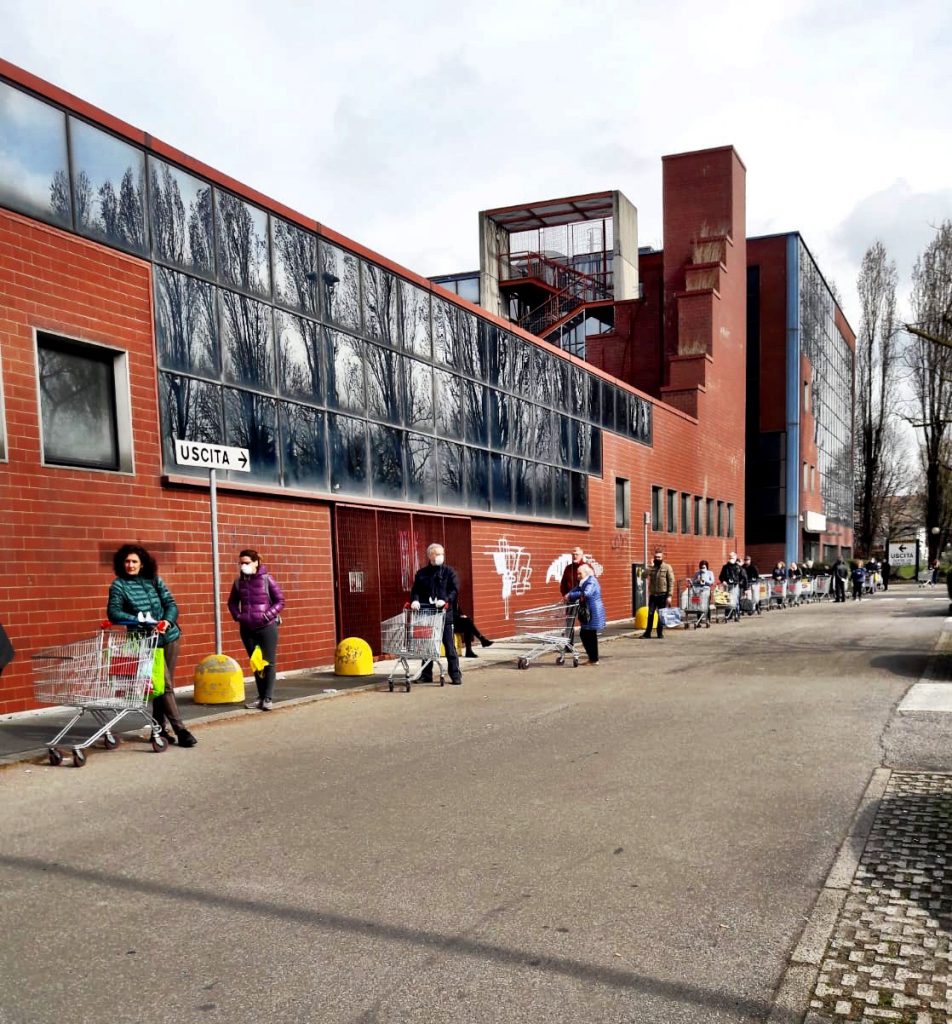
Since it began, 2020 has been “the year of the coronavirus.” In recent weeks, we have witnessed the spread of the virus not only in China, but also in Asia, Europe, and the US. As I write this post, I have just heard the news that all of Italy (not just the north, as previously ordered) is going into lockdown, a measure about which, as an Italian, I have considerable apprehension. I was in Italy during the first outbreak, when some municipalities were isolated. Within a few days, many cities in northern Italy had imposed a slowdown; and within a couple of weeks, hospital ICUs in the north were filled with infected people. Overloaded, they could not cope with the emergency. The government has thus decided to extend the measures adopted for the Lombardy region and some municipalities in the north, to the entire country: schools and gathering places (theaters, museums, cinemas, gyms, etc.) were shuttered, recreational activities suspended, and bars and restaurants closed after 6 pm. Companies also let employees work from home whenever possible, or put them on vacation. It is not difficult to imagine the crises faced by small businesses as well as by the whole entertainment and tourism sector.
In this dramatic situation, where travel and meetings are reduced to the bare minimum, all we can do is stop and wait. But, putting aside for a minute the difficulties we face, we also are given time that we usually don’t enjoy in our daily frenzy. So that we can think about what is happening now, about what we would like our everyday life to become, the changes that are now inevitable, and the new life that awaits us, time is necessary; this time is a “luxury” that we are not always able to afford.
One reflection on this emergency comes from four philosophers (Giorgio Agamben, Jean-Luc Nancy, Roberto Esposito, & Luca Paltrinieri), starting from a comment published in the newspaper Il manifesto by Agamben on February 26, 2020. Theirs is a wide-ranging philosophical reflection on the epidemic, politics, biopolitics, and the globalized world. “The invention of an epidemic” (here’s the Italian original and the English translation) is the title of Agamben’s piece, an accusation against the “frenetic, irrational and absolutely unwarranted emergency measures” adopted by the Italian government. Agamben denies the severity of the virus (“a variant of flu”) and claims that the climate of panic is fueled by the media. (While I was in Italy, television news and political talk shows did not, to be honest, address any other topic.) In this crisis, the media, together with the authorities, have caused – he believes – a “true state of exception.” The core of Agamben’s criticism lies in the tendency to “use the state of exception as a normal governing paradigm,” which, as in the cases of the fight against terrorism, offers the government an opportunity to centralize power by limiting individual freedom. Moreover, the “state of fear” that we see now, according to Agamben, has been consolidated in individual consciences in recent years and “translates into a real need for states collective panic.” As an example, we can cite the rushes to supermarkets to buy anything left on the shelves or the escape from the lockdown areas.
Jean-Luc Nancy is the first to respond to Agamben (“Eccezione virale” on Antinomie, February 28, 2020; a partial English translation is “Viral Intrusions and (other) Friendships”). Rather than strengthening the power of the state, which is now reduced to a mere executor, Nancy focuses on the “viral exception – biological, computer, cultural – that is pandemic.” The exception has become the rule, and it is fueled by the intensification of the technical interconnections that have spread to every aspect of our life.
Precisely this relevance given to technological devices at the expense of the biopolitical paradigm is the starting point of Roberto Esposito’s reflection (“Curati ad oltranza,” [Indefinitely cured] on Antinomie, February 28, 2020). Esposito recognizes in the behavior of the state “the full deployment of biopolitics” because any conflict or measure has at its center the relationship between politics and (biological) life. According to Esposito, two factors emerge clearly in this situation: 1) the “medicalization of politics,” which aims to “cure” its citizens with the welfare state figured as a sort of “providence-state;” and 2) the “politicization of medicine,” which has to deal with tasks of social control “that are not under its jurisdiction.” The conclusion drawn by Esposito is opposite to that of Agamben. He observes a “decomposition of public powers [rather] than that of a dramatic totalitarian grasp.”
The last to join the debate is Luca Paltrinieri (“Prove generali di apocalisse differenziata” [General rehearsals of a differentiate apocalypse], Antinomies, March 1, 2020), and sketches a more general reflection on the Western economic system and the unsustainable consequences (the climate emergency, in particular) that we have reached. According to Paltrinieri, the “apocalypse” we are witnessing is that of the end of progress. Here, progress is understood as “material” progress: an “intensification of production and distribution.” In short, it will not be possible for our children to have a (materially speaking) better life than ours. Our vision of the world cannot be carried forward for long, but – the philosopher asks – how aware of this are we? According to Paltrinieri, it is our freedom, understood as freedom of choice (also intended as the “possibility of consuming”), which we are not willing to give up. Our freedom derives from a process of improvement of the condition of the poorer classes. This process has led to a reduction in the birth rate and low mortality rate but at the cost of an “unprecedented ecological catastrophe.” The future that awaits us is that of a “collapse” (effondrement), or the inability of the state to provide for everyone’s needs. The Covid-19 outbreak—with its insufficiency of ICU beds and the ensuing economic difficulties that are emerging from the forced quarantine—is merely one instance.
Paltrinieri reproaches Agamben and Nancy for reasoning as if there was a “homogeneous world horizon” to which we could refer. But China is not Europe. Its emergency management cannot be considered, according to Paltrinieri, as a state of exception as intended in Europe. Instead, he agrees with Esposito regarding the liquefaction of state-providence. It is no longer possible to protect, or “cure” (using Esposito’s term), citizens according to a “virtuous circle between economic development and population,” the option that – Paltrinieri recalls – founded the European concept of freedom. The choice, as in the fight against the virus, is now between freedom and salvation. The only chance for salvation is to “end a certain idea of freedom as economic growth [whereby I save myself only at the expense of others], material choice, and individual property.”
I decided to share these ideas because I believe these four articles offer a chance to think through this emergency from a different point of view, regardless of whether one agrees with them or not. I believe that, even in its tragedy, this infection can also be taken as our opportunity to change perspective.
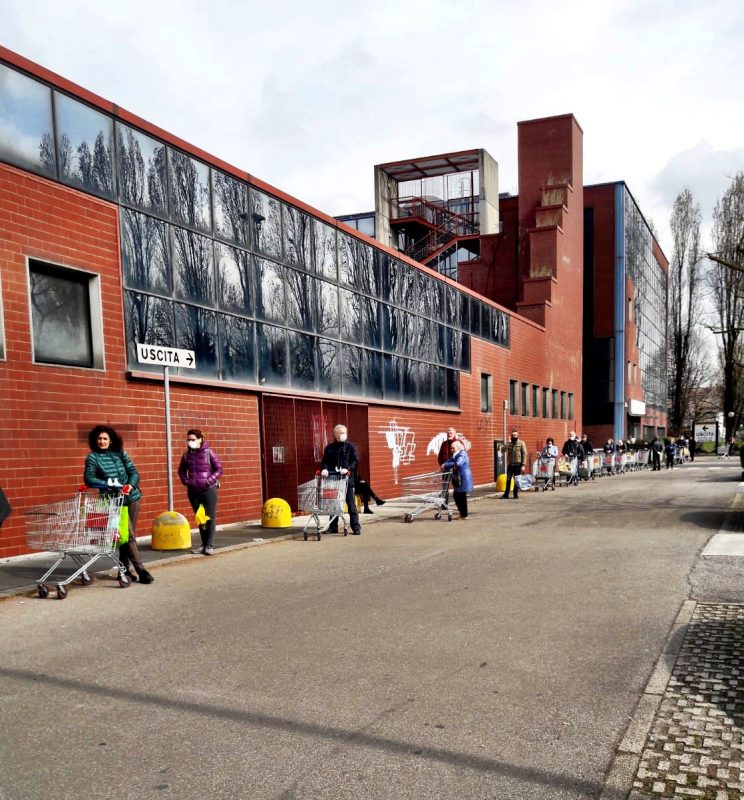
イタリアのスーパーの前のお客さんの列
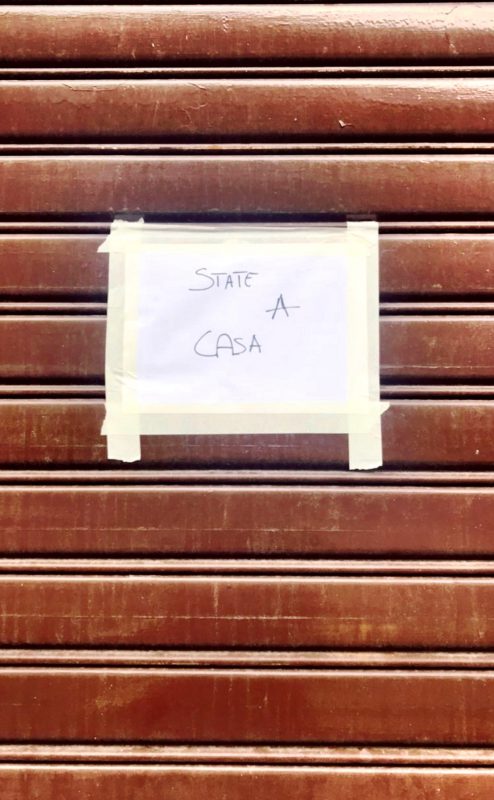
閉まっている店に貼ってある「家にいなさい」のメッセージ


